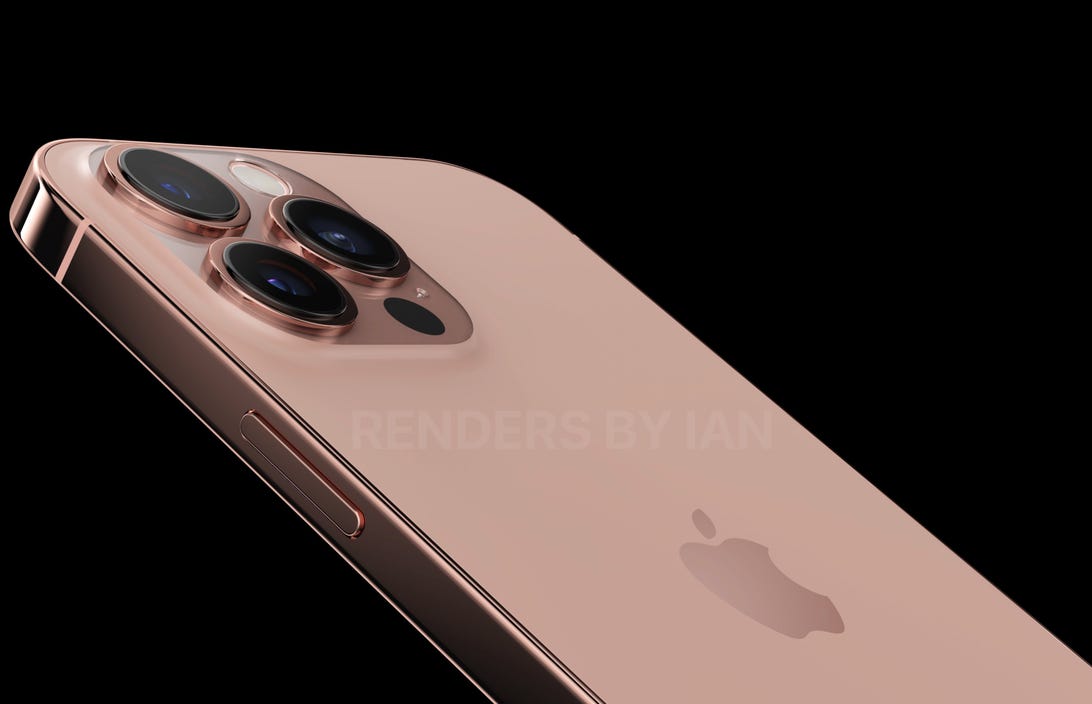
Apple could add a new “Sunset Gold” color to iPhone 13 lineup.
RendersbyIan/Twitter
Apple’s latest iPhone, possibly called the iPhone 13, could house some snazzy new features, including an updated design, longer battery life, an upped refresh rate, camera upgrades and more. We don’t know exactly what to expect for new iPhone, but the rumor mill keeps turning.
As we inch closer and closer to the iPhone 13’s possible reveal, it seems like the hype for the new Apple smartphone continues to grow. According to a recent survey by SellCell, reported on my Macrumors, 44% of current iPhone users plan to upgrade to one of the iPhone 13 models when it becomes available.
We’ve heard that the iPhone 13 lineup will feature four phones — the iPhone 13, iPhone 13 Mini, iPhone 13 Pro and iPhone 13 Pro Max — as reported earlier by analyst Ming-Chi Kuo. This lineup matches the four iPhone 12 models from last year. But that’s not all that’s staying the same: The iPhone 13’s price and design might be familiar as well.
We’ve collected these rumors and everything else we’ve heard below, including speculation about the iPhone 13’s release date (rumors say September, as usual), how the iPhone 13 might compare to the iPhone 12 and everything we know about the iPhone 13’s priceand other specs. (And don’t miss our iPhone 13 wish list.) We have a few more months of speculation before Apple unveils its next flagship, so buckle up and read on. We’ll update this story as new information becomes available.
Read more: Should you even still buy an iPhone 12? What if you really want the purple iPhone?
Battery: Larger capacity doesn’t mean iPhone 13 will have a longer battery life
A rumor from Chinese social media platform Weibo in early June suggested that the iPhone 13 lineup will feature larger batteries than the iPhone 12 lineup. The specs, shared on Twitter by leaker @L0vetodream, claim a 2,406-mAh battery for the iPhone 13 Mini, going up to 3,095 mAh for the iPhone 13 and iPhone 13 Pro, and 4,325 mAh for the iPhone 13 Pro Max.
These battery sizes are all upgrades over the iPhone 12’s respective capacities (though Apple doesn’t disclose official battery specs). However, battery life is not the same as battery capacity, so it’s possible that the increase in iPhone 13’s battery size will not translate into a longer battery life. That all depends on the phone’s other upgrades and how well its software optimizes for battery life. But compared with other brands’ premium phones, Apple’s batteries fall short. The batteries in Samsung’s Galaxy S21 lineup, for example, range from 4,000 to 5,000 mAh.
Read more: iOS 15: Release date, new features and every rumor, detailed
When it comes to charging its battery, the iPhone 13 could have some new tricks up its sleeve with faster wireless charging and possible reverse charging capabilities, according to a video from EverythingApplePro on YouTube via leaker Max Weinbach. Reverse charging is a feature that allows you to charge other Qi devices on the back of your phone. Weinbach speculates the upcoming iPhone 13 will have this feature due to a bigger wireless charging coil and a stronger set of magnets housed in the back of the phone. Many of the iPhone’s competitors including the Samsung Galaxy S21, Samsung Galaxy S20, the Samsung Galaxy Note 20 Ultra and the OnePlus 8 Pro already have reverse wireless charging. But, Apple has yet to introduce the feature to its iPhones.
Release date: iPhone 13 should be here by mid-September
So far, there’s no official or unofficial word on when we can expect to see Apple’s next iPhone. An April report suggested the manufacturing of the iPhones’ new chips were running ahead of schedule, putting the iPhone 13 release date back on Apple’s pre-pandemic timeline. Usually, we can predict with some degree of accuracy when Apple’s iPhone events will occur and extrapolate a release date based on that.
But 2020 was a different story — it was the first September Apple event in eight years without an iPhone — thanks to delays in production due to the coronavirus pandemic. This year, however, Kuo is also forecasting business as usual for Apple’s supply chain. If that’s the case, we can expect to see the iPhone 13 unveiled at an event sometime in September.
Let’s synthesize the info we have:
- Apple likes to hold its events on Tuesdays or Wednesdays.
- iPhone release dates are typically a week and a half after Apple’s announcements.
- In general, new iPhones are released on a Friday, around the third week of September.
A few years ago, CNET took a deep dive into the Apple event timeline and emerged with a compelling Labor Day hypothesis, which you can read about here. Based on the 2021 calendar, the Labor Day rule would put the September Apple event (and unveiling of the iPhone 13) on Sept. 8, with a Sept. 17 release date.
No matter the date, Apple’s next iPhone event could be fully virtual like last year. In his Power On newsletter, Bloomberg’s Mark Gurman said that the event will be completely virtual because of the tech giant’s decision to delay its return to in-person work due to rising COVID-19 cases.
Apple originally said that all employees would be required to come into the office three days a week starting in September. Gurman says that if Apple stuck with the September timeframe, an in-person iPhone 13 event would have been “plausible.” Now, he expects another online-only event.
Read more: iPhone 13 wish list: What Apple needs for its next phone to succeed
Name: Apple sticks with ‘iPhone 13’ for next flagship
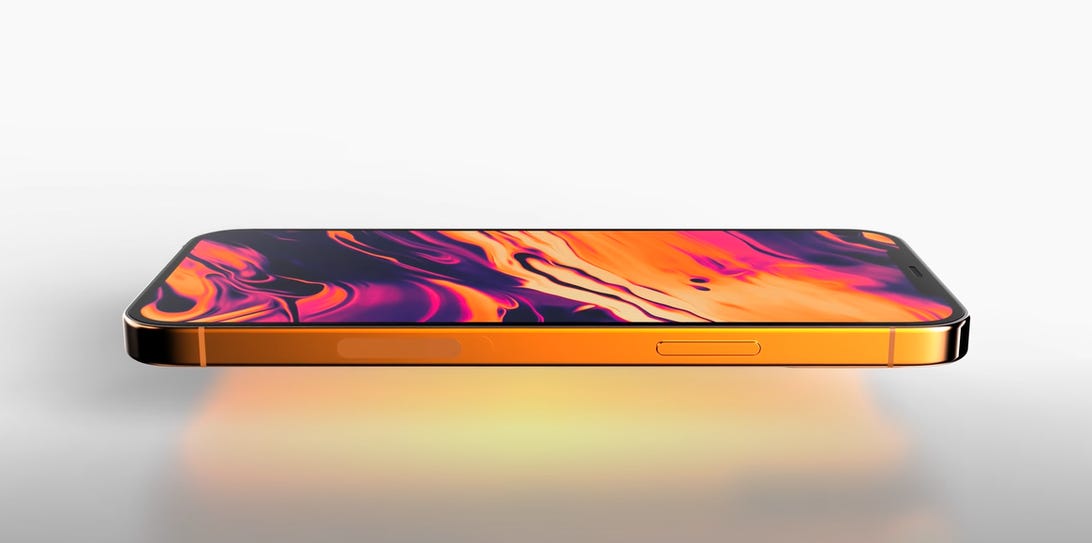
iPhone 13 render
EverythingApplePro
Apple will call its next lineup “iPhone 13,” according to a report from Taiwanese publication Economic Daily News. The rumored decision to adhere to its standard naming method followed speculation that the tech giant would switch up the new iPhone’s title and dodge the superstition associated with the number. Considering high-rise buildings tend to omit the 13th floor from their elevator buttons for superstitious reasons, previous rumors suggested Apple could succumb to its own triskaidekaphobia and skip the number 13.
Read more: iPhone 13 might be the phone that never hits shelves. Here’s why people think so
iPhone 12S was a worthy guess for the name of Apple’s next generation of iPhones. Just as 2014’s iPhone 6 gave way to 2015’s iPhone 6S and 2017’s iPhone X preceded 2018’s iPhone XS, without a major redesign in the works (more on that below), the 2021 iPhone seemed just as likely to be positioned as an improvement on the iPhone 12.
Or maybe Apple could have taken a page out of Samsung’s book and named its next phone after the year of its conception: iPhone 2021 has a nice ring to it. Or what about the iPhone XXI? Or, dare to dream, Apple could have gone in a completely different direction and name it something fun, like the Motorola Citrus or LG Chocolate of yore.
Price: iPhone 13 could cost the same as iPhone 12… or less
Apple’s iPhone 12 lineup included four phones at four prices, with even more variation among carriers and storage configurations. At launch, the baseline iPhone 12 carrier model cost $799, an increase of $100 from 2019’s iPhone 11, largely due to the addition of 5G support. Because the iPhone 13 is not expected to have such a major technical upgrade, analysts are predicting a similar price structure for 2021.
GIF by Caitlin Petrakovitz/CNET
Here’s the iPhone 12’s US pricing, for reference:
iPhone 12 pricing: All four models
| iPhone 12 model | 64GB | 128GB | 256GB | 512GB |
|---|---|---|---|---|
| iPhone 12 Mini (carrier model) | $699 | $749 | $849 | N/A |
| iPhone 12 Mini (SIM-free from Apple) | $729 | $779 | $879 | N/A |
| iPhone 12 (carrier model) | $799 | $849 | $949 | N/A |
| iPhone 12 (SIM-free from Apple) | $829 | $879 | $979 | N/A |
| iPhone 12 Pro | N/A | $999 | $1,099 | $1,299 |
| iPhone 12 Pro Max | N/A | $1,099 | $1,199 | $1,399 |
There is some speculation that Apple might consider lowering the price of its next phone lineup. Several rivals rose to the occasion of the economic downturn by releasing more affordable models in 2020, such as Samsung’s Galaxy S20 FE and Google’s Pixel 5: Both are the same price as the iPhone 12 Mini, but about $100 less than the iPhone 12. The newly released Samsung Galaxy S21 also boasted a lower price tag, starting at $200 lower than its predecessor.
Sales of the iPhone 12 could indicate the direction Apple might take in pricing the iPhone 13. The predicted 2020 “supercycle” seems to have happened as Apple expected: In October, the iPhone 12 and 12 Pro became the first and second best-selling 5G phone models worldwide. And Apple recently announced that the iPhone 12 led to the largest revenue and profit in the company’s history.
Colors and design: iPhone 13 will probably look familiar
There have already been a number of renders floating around the Twittersphere showing rumored iPhone 13 designs. A recent one, from MacRumors, illustrates the resized camera bump and increased thickness of the iPhone 13 and 13 Pro compared to its predecessors. According to MacRumors, the iPhone 13’s camera bump is getting slightly thicker, perhaps to accommodate forthcoming camera upgrades like lidar.
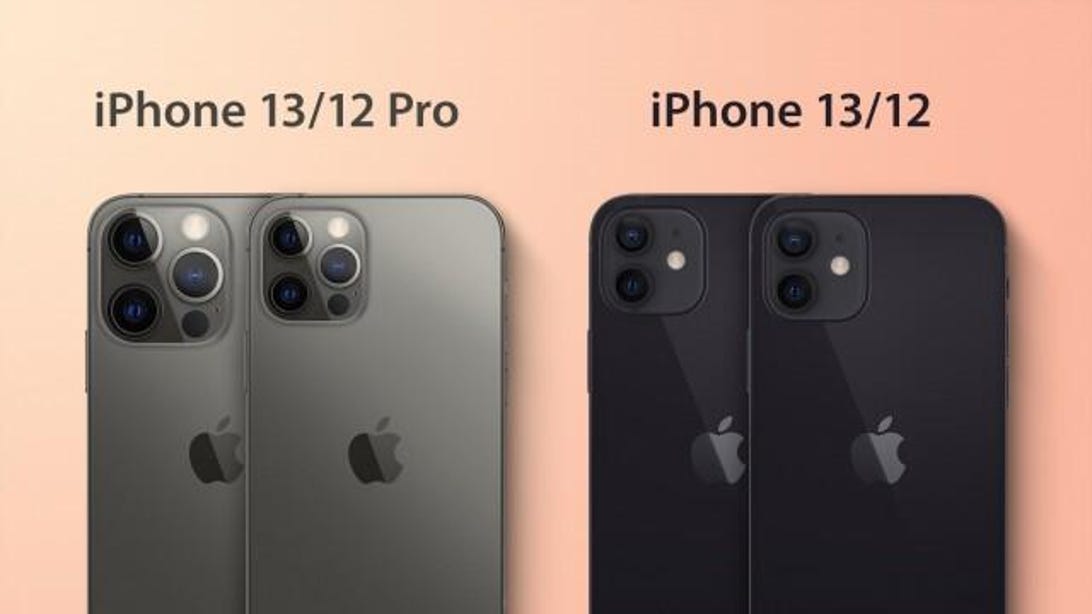
iPhone 13 versus iPhone 12 camera bumps.
MacRumors
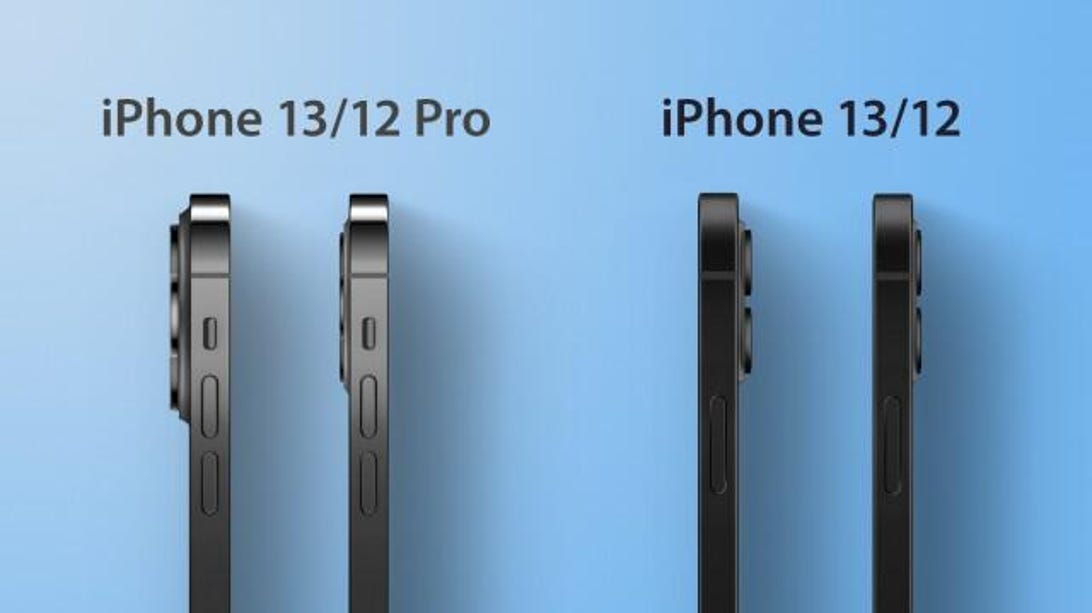
iPhone 13 and iPhone 12 rumored thickness compared.
MacRumors
A new render in late June from Sonny Dickson on Twitter showed a slight variation on the iPhone 13 and 12 Mini’s camera module, with its two lenses situated diagonally from one another, rather than one atop the other.
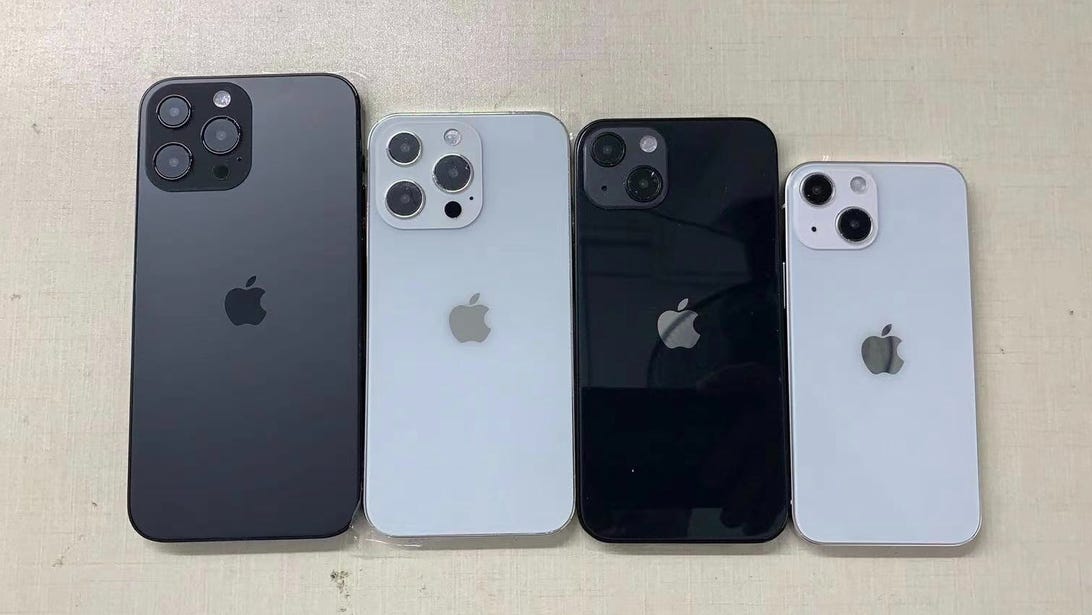
This dummy iPhone 13 lineup shows a redesigned camera module for the iPhone 13 and 13 Mini.
Sonny Dickson
The Twittersphere was abuzz in early May when an account called Peng Phones released a supposedly leaked image of a bubblegum pink iPhone 13, though the image ended up being wishful thinking from an artist on Instagram who specializes in 3D modeling. Then in June, YouTube account EverythingApplePro previewed a matte-black iPhone 13 render, said to be a replacement for the existing graphite or space gray color options on the iPhone 12 Pro and iPhone 11 Pro models, respectively.
Apple also could be adding a new color, called “Sunset Gold,” to the iPhone 13 lineup, according to leaker Ranzuk on Naver, a Korean blogging platform. The color is said to have a “bronze feel” and be slightly less pale than Apple’s rose gold. Renders of the iPhone 13’s new color were posted to Twitter by @RendersbyIan.
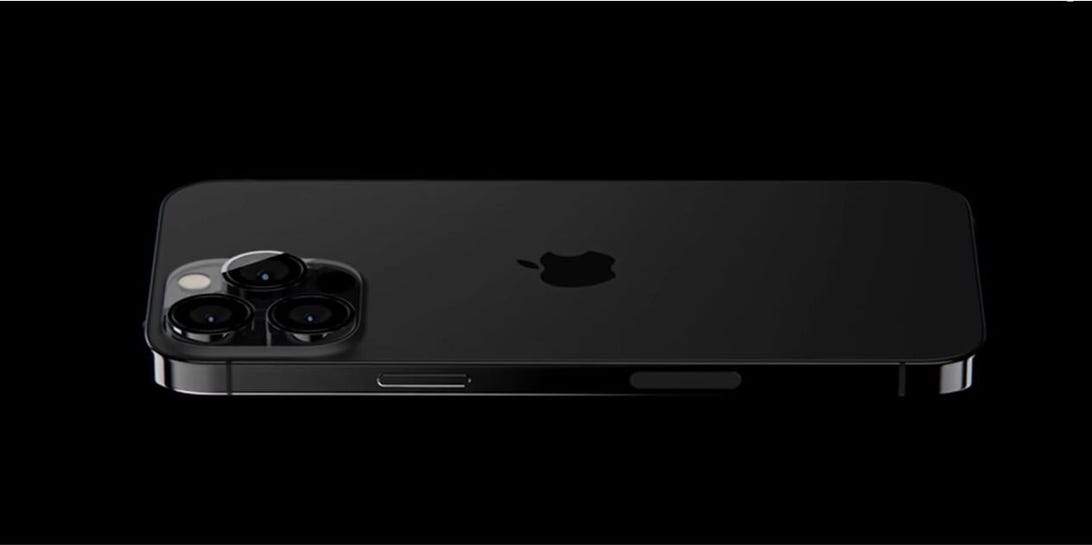
The rumored matte-black color option for the iPhone 13.
EverythingApplePro
Earlier, we spotted a 3D-printed mockup from Japanese blog Macotakara and some concept renderings from EverythingApplePro. But we don’t expect any big changes to the iPhone’s design in 2021, considering 2020 saw a pretty significant “slabular” redesign already with the return of the iPhone 5’s flat sides. Apple is also not expected to make any changes to the phone’s sizing from the previous generation.
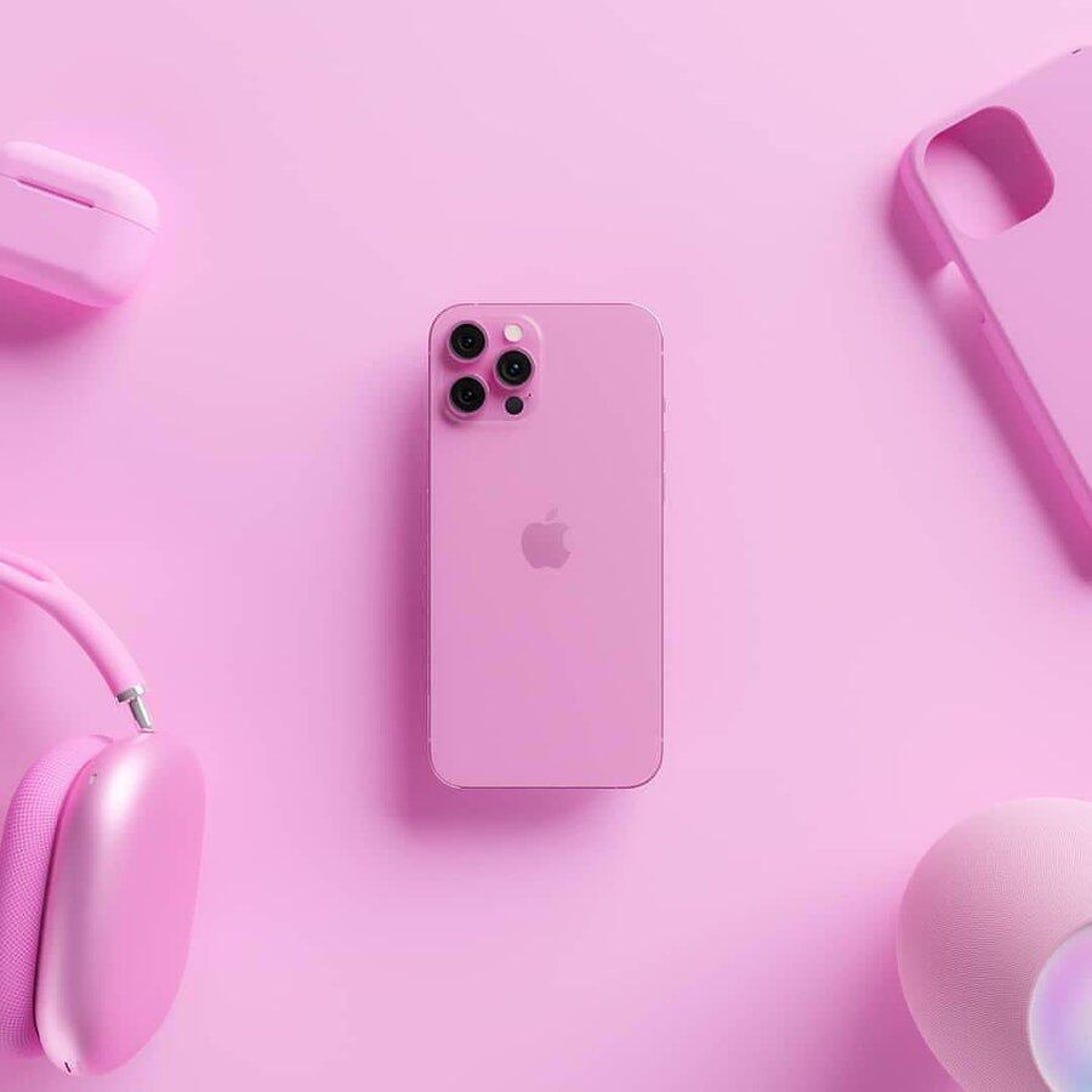
The purported pink iPhone 13.
aliartist3d
iPhone 13’s rumored sizes
- iPhone 13 Mini: 5.4-inch
- iPhone 13: 6.1-inch
- iPhone 13 Pro: 6.1-inch
- iPhone 13 Pro Max: 6.7-inch
Two potential design elements that are getting some decent buzz already: a shallower notch, which is also evident in several leaked mockups (or even a completely notchless screen) and the death of the Lightning port, both of which have been speculated about, hoped for or dreaded ad nauseam for generations of iPhones.
A shallower notch was also shared in an Apple Insider video which showed dummy units of the iPhone 13 a smaller earpiece notch that shifted to the top of the phone’s bezel. Apple Insider’s dummy units were also in line with the previous rumors regarding the iPhone 13 lineup’s size similarities to the iPhone 12.
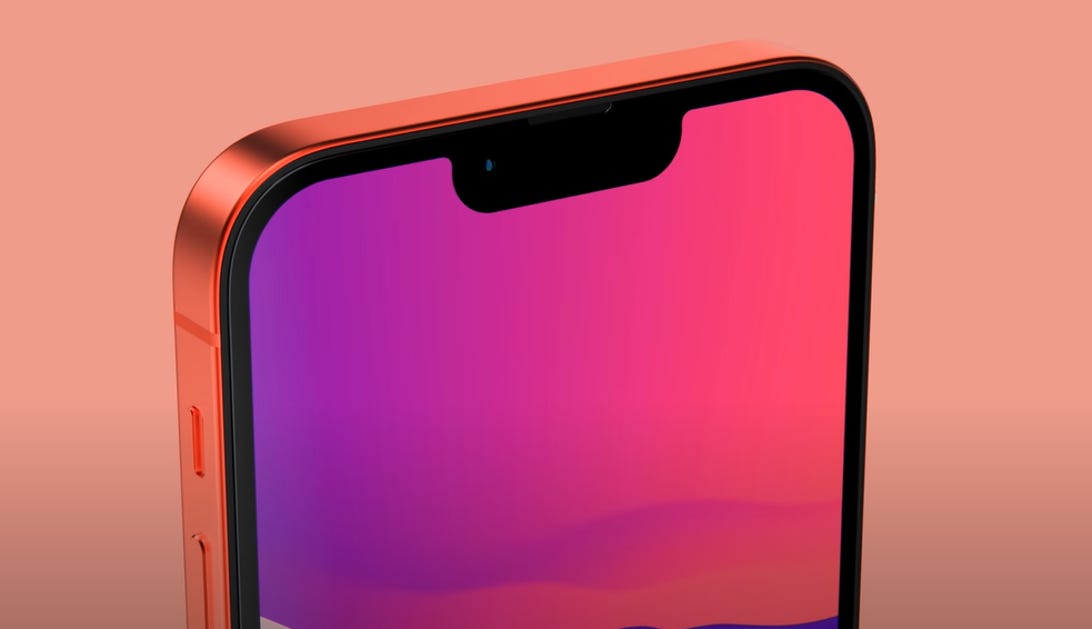
iPhone 13 rendering
EverythingApplePro
iPhone 13 may nix the chunky notch — or just slim it down
Apple introduced the world to the notched display in 2017 with the release of the iPhone X, and as rivals solved the selfie conundrum with hole-punch and under-display cameras, Apple still hasn’t, er, taken it down a notch. Those who crossed their fingers for a notchless or at least smaller-notched iPhone 12 are reassigning their hopes to the iPhone 13 now that their 2020 all-screen dreams have failed to come to fruition.
Rumors of a smaller notch resurfaced in early March in an investors note from analyst Ming-Chi Kuo. In its leaked dummy mockup, Macotakara estimated that the iPhone 13’s notch could shrink to 26.8mm wide (compared to 34.83mm on the iPhone 12), while becoming ever-so slightly taller, at 5.35mm, compared to the iPhone 12’s 5.3mm notch height.
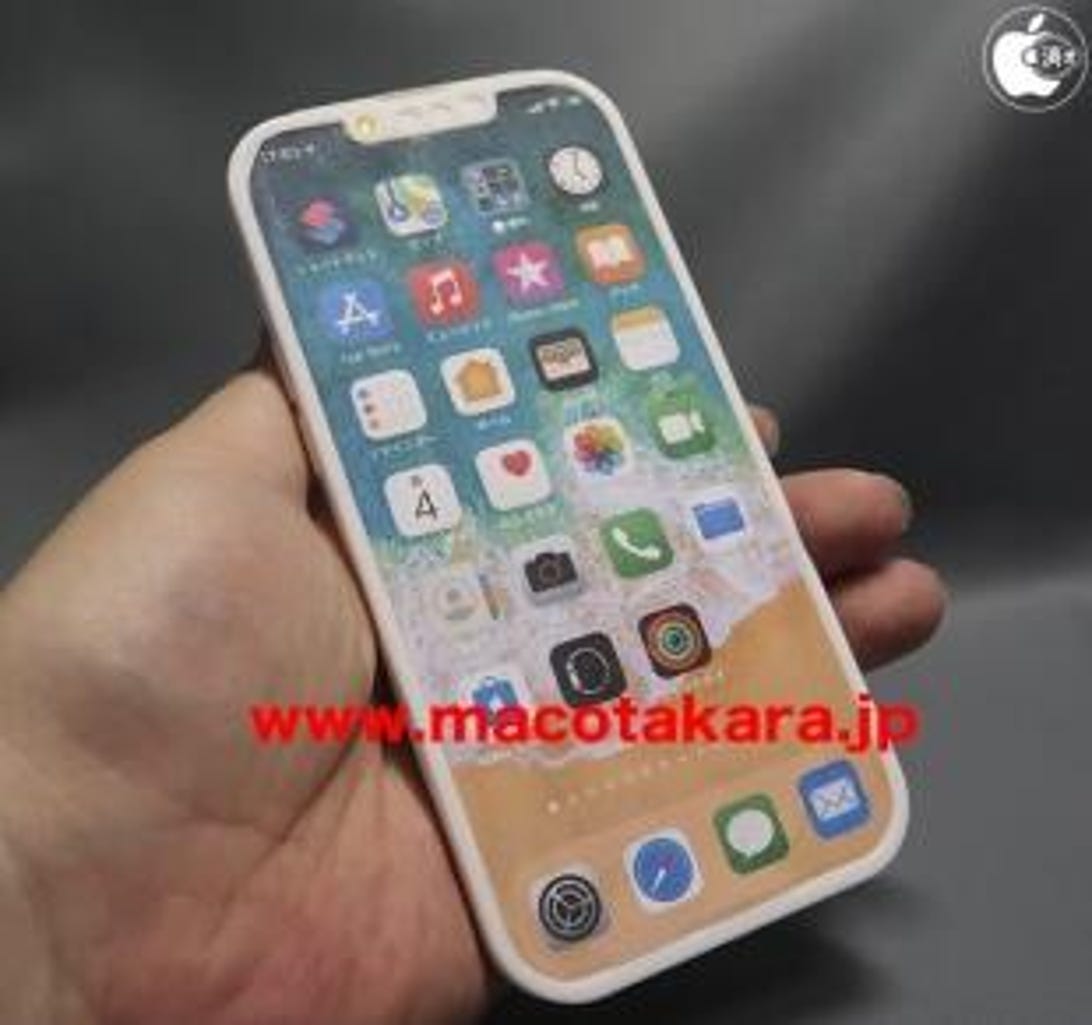
A leaked 3D-printed mockup of the iPhone 13, featuring a slimmed notch.
Macotakara
Will Apple kill the Lightning port, too?
When Apple ousted the headphone jack, the doomsday clock started ticking for the iPhone’s charging port as well, according to industry analysts. Though a lot of us are still holding out hope for a USB-C port, the introduction of MagSafe accessories in 2020 all but sealed the deal on a portless future for the iPhone. Frequent leaker Jon Prosser shares this prediction, asserting on his YouTube channel, “The end goal is very obviously portless.”
But don’t get too excited (nervous?): Kuo predicts that only one 2021 iPhone will be completely portless, likely the iPhone 13 Pro Max.
iPhone 12 Pro’s Magsafe charger.
Apple
Cameras: New photo tricks and tech coming to the iPhone 13
The iPhone got some pretty well-received camera upgrades in 2020, especially in the Pro Max model, which introduced the iOS crowd to lidar (also found on the Pro) and ProRaw. The iPhone 12 even wrested CNET photo enthusiast Stephen Shankland’s loyalty away from Google Pixel, the erstwhile computational photography king.
Read more: iPhone 13 camera rumors: The specs and upgrades we’ll likely see
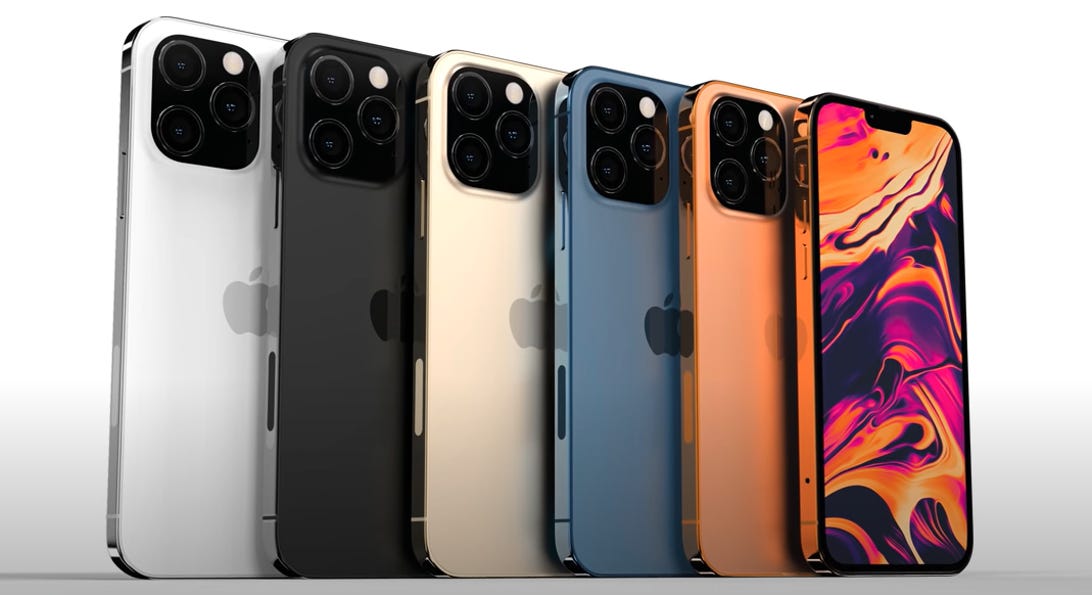
iPhone 13 rendering
EverythingApplePro
Better zoom capabilities for the iPhone 13
One weak spot in the 2020 lineup’s camera offerings, however, was zoom technology. The iPhone 12 Pro Max only featured a 2.5x optical zoom — for comparison, Samsung’s Galaxy S20 Ultra and now the S21 Ultra both offer a 100x zoom (though it is a mix of optical and digital).
According to ETNews (as reported by TechRadar), the iPhone 13 could potentially include a periscope camera, a technology that would allow for a larger zoom range without requiring an even larger camera bump. Kuo made similar predictions for a future periscope lens, though his report hinted that we may have to wait until 2022. It’s also possible that the 2.5x zoom found on the iPhone 12 Pro Max could trickle down to the next iPhone’s Pro model.
Improved night-mode photos
Rumors in early February hinted at welcome improvements for low-light photography. Analysts are predicting an ultrawide-angle lens with a larger aperture — f1.8, instead of f2.4. A larger aperture means more light can hit the sensor, which makes for better photos at nighttime or in low-light situations.
Lidar could only be available for the Pro models
Although camera upgrades are expected across all four iPhone 13 models, the standard versions of Apple’s upcoming handset may lack a lidar scanner. Leaker Dylan on Twitter speculates that only the iPhone 13 Pro and Pro Max will feature the scanner. Dylan’s theory followed previous Apple iPhone gossip from a DigiTimes report that said all four models in the iPhone 13 lineup would come with the scanner.
This would be the second generation in a row to only feature a lidar scanner in its Pro models, if Dylan’s rumor becomes reality. The scanner, used to help with autofocus and portrait pictures in low lighting, made its debut in the 2020 iPad Pro. It also can be found in the iPhone 12 Pro and iPhone 12 Pro Max.
Read more: What does the iPhone’s lidar feature actually do?
Still, lidar for everyone would be pretty nifty — the camera feature, which stands for “light detection and ranging,” is a depth sensor that uses lasers to measure distance. The camera trick can take your iPhone photos to the next level, and it also has some pretty cool AR applications.
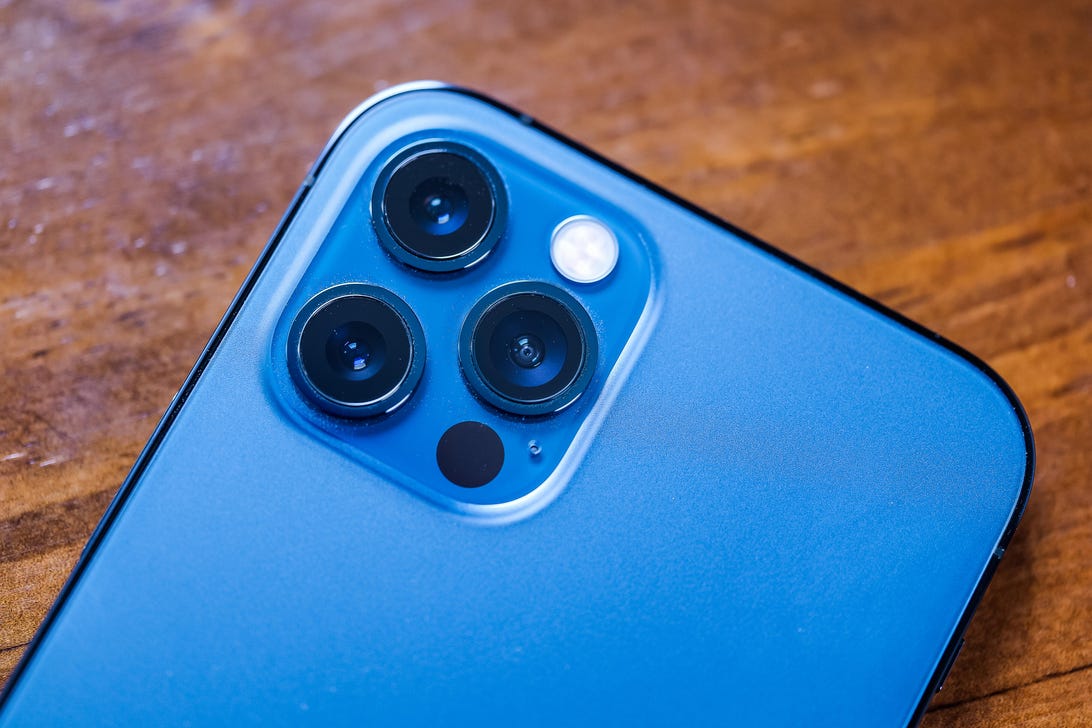
The iPhone 12 Pro’s lidar sensor — the black circle at the bottom right of the camera unit — opens up AR possibilities and much more.
Patrick Holland/CNET
Features: All the other iPhone 13 rumors we’ve heard
There’s a lot we can confidently predict for the 2021 iPhone lineup based on last year’s features and Apple’s usual track record. For instance, 5G is all but a foregone conclusion. There probably won’t be a charger or headphones in the box, nor a headphone jack, nor a USB-C port. And unless 2021 throws us for an even bigger loop than 2020, we expect Apple to ship the iPhone 13 with the new iOS 15 installed. (By the way, iOS 14.6 is here and iOS 14.7 is on the way.)
120Hz refresh rate for the iPhone 13 Pro and Pro Max
We thought we’d get a refreshed refresh rate in the iPhone 12, but the 120Hz rumors didn’t pan out — likely because of the already increased demands on battery from the phone’s 5G connectivity. Instead, Apple’s lineup last year featured the same 60Hz display as the previous year’s iPhone 11.
But 2021 could be the year of the 120Hz display, which would result in a smoother, faster scrolling experience thanks to a higher screen refresh rate. Many higher-end competitors already feature a 120Hz display (e.g., the OnePlus 8T and Galaxy S21), so the odds are good Apple heads in this direction for its next Pro line.
Evidence for doubling the refresh rate in 2021 comes from Korean news site The Elec, which reports that two of the iPhone 13 models will use LTPO technology in their screens. This screen tech would make the phone more power efficient in general, meaning smaller batteries and/or longer battery life are also probable (not to mention whispers about an always-on display). Learn more about LTPO, or low-temperature polycrystalline oxide, OLED screens. This rumor was repeated by well-known leaker Max Weinbach in mid-February on YouTube and again in an April DigiTimes report.
An always-on display
Like the Apple Watch (and many Android phones, like the Galaxy S21 and Pixel 5), the iPhone 13 may have its own version of the always-on display, what Weinbach called a “toned-down lock screen.” If rumors are true, your next iPhone would always display the time and battery charge, as well as incoming notifications, without you having to unlock or wake the whole screen.
Rumors about this feature were corroborated in July by Bloomberg’s Mark Gurman in his Power On newsletter. He speculates that the iPhone’s larger batteries could power its display with a 120Hz refresh rate and always-on mode.
Return of the Touch ID button
Bloomberg reported in 2019 that the beloved Touch ID button might return as an under-display sensor in the following year’s flagship, which would have been the iPhone 12. That didn’t happen, but the Bloomberg report left room for error, saying the technology could “slip to the 2021 iPhone refresh.”
Twitter leaker @L0vetodream also teased an under-display Touch ID last fall, which was subsequently corroborated (and translated) by Prosser.
“MESA” is Touch ID.
“uts” is “under the screen”
— Jon Prosser (@jon_prosser) October 16, 2020
Apple’s 2020 iPad Air, announced last September during what normally would have been an iPhone unveiling event, integrated a Touch ID button onto the side of the device. The new iMac, unveiled in April, is also getting a Touch ID button on its redesigned Magic Keyboard. This addition is exciting because it solves the “Face ID doesn’t work while wearing a mask” problem without ceding screen real estate. An under-display button would solve the problem, too, though it remains to be seen whether the tech will be ready in time for the iPhone 13. (Meanwhile, those who own an Apple Watch already have yet another option for masked iPhone-unlocking as of iOS 14.5.)
As we near the purported September iPhone announcement, we’ll keep this post updated with all the iPhone 13 leaks, rumors and other speculation as it comes up, so check back.
And in the meantime, here’s what you should know about the iPhone 12:





